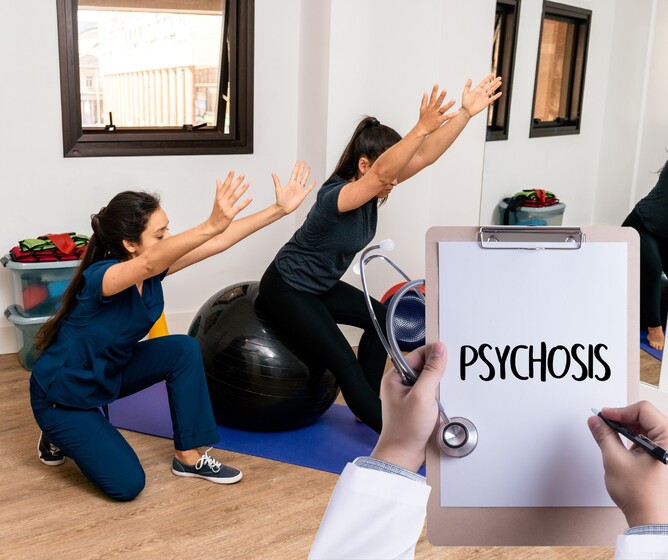Physical Rehabilitation in Psychosis: How Physiotherapy Can Aid Recovery
Psychosis is a mental health condition characterized by a detachment from reality. Individuals experiencing psychosis may have hallucinations (seeing or hearing things that aren't there) or delusions (strongly held false beliefs). It can occur in various psychiatric disorders such as schizophrenia, bipolar disorder, or as a result of substance abuse or medical conditions. Treatment often involves medication and therapy to manage symptoms and improve quality of life.
Physical rehabilitation, often referred to simply as "rehabilitation," is a healthcare specialty focused on restoring physical function and mobility after injury, illness, or surgery. It involves a combination of exercises, therapies, and interventions tailored to individual needs. The goal is to improve strength, flexibility, endurance, and overall quality of life, enabling individuals to regain independence and return to their daily activities. Physical therapists and other healthcare professionals typically oversee and administer rehabilitation programs based on the specific needs and condition of the patient.
Physiotherapy, also known as physical therapy, is a healthcare profession that focuses on promoting mobility, function, and quality of life through physical interventions. It involves the assessment, diagnosis, and treatment of individuals across various ages with medical conditions or injuries that limit movement and functionality. Physiotherapists use a variety of techniques such as exercise, manual therapy, and modalities like ultrasound or electrical stimulation to help patients manage pain, improve strength and flexibility, and restore physical abilities. The goal is to optimize physical function and prevent further disability.
Physical Rehabilitation in Psychosis
Physical rehabilitation in the context of psychosis refers to the integration of physical therapy techniques and interventions into the overall treatment plan for individuals experiencing psychosis. While the primary focus in psychosis treatment is typically on managing psychiatric symptoms such as hallucinations and delusions, physical rehabilitation can play a crucial role in enhancing overall well-being.
People with psychosis may experience physical health challenges due to factors like medication side effects, sedentary lifestyle, or neglect of physical health needs. Physical rehabilitation aims to address these issues by promoting physical activity, improving fitness levels, and addressing any musculoskeletal problems that may arise.
How Physiotherapy Can Aid Recovery
Physiotherapy can aid in the recovery of psychosis by addressing specific physical health challenges and supporting overall well-being:
Managing Medication Side Effects: Psychiatric medications used to treat psychosis can lead to weight gain, metabolic changes, and movement disorders. Physiotherapists can design exercise programs to mitigate these effects, promoting weight management, cardiovascular health, and addressing movement difficulties.
Improving Physical Fitness: Many individuals with psychosis experience reduced physical fitness due to sedentary behavior or medication effects. Physiotherapy focuses on improving strength, endurance, flexibility, and coordination through targeted exercises, which can enhance overall physical health and quality of life.
Enhancing Motor Skills and Mobility: Psychosis and prolonged hospitalization can lead to reduced mobility and motor skill impairments. Physiotherapists work on improving balance, coordination, and gait, helping individuals regain independence in daily activities and promoting confidence in movement.
Addressing Musculoskeletal Issues: Individuals with psychosis may develop musculoskeletal problems such as stiffness or pain due to reduced physical activity. Physiotherapy interventions such as manual therapy, stretching exercises, and modalities like heat or ultrasound can help alleviate these issues, improving comfort and mobility.
Promoting Social Interaction and Routine: Physiotherapy sessions provide structured activities that promote social interaction and adherence to a routine, which can be beneficial for individuals with psychosis who may struggle with social isolation or irregular daily patterns.
Supporting Mental Well-being: Engaging in physical activity can have positive effects on mental health by reducing stress, anxiety, and depression symptoms commonly associated with psychosis. Physiotherapists offer encouragement, motivation, and support, contributing to overall psychological well-being and resilience.
Conclusion
Integrating physiotherapy into the treatment of psychosis represents a significant enhancement to overall care. Beyond managing psychiatric symptoms, physiotherapy addresses crucial physical health challenges associated with the condition. By improving fitness levels, managing medication side effects, enhancing mobility, and supporting mental well-being, physiotherapists play a vital role in promoting recovery and quality of life for individuals experiencing psychosis.
At Holistic Strength, our integrated approach to recovery emphasizes the importance of addressing both the mental and physical aspects of health. Physiotherapy plays a vital role in this approach by promoting physical rehabilitation and enhancing overall well-being for individuals experiencing psychosis. Through personalized interventions and collaborative care, our physiotherapists strive to empower individuals on their journey towards recovery.
